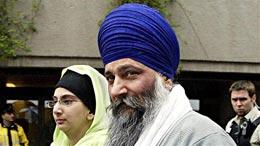Sikh exiles in Canada on Indian blacklist

The chief minister of Punjab, where hundreds of thousands of Canada’s South Asians hail from, is calling for the early release of convicts and exiles linked to terror organisations.
Parkash Singh Badal’s call for the release of Sikh convicts, including the assassins of former Punjab chief minister Beant Singh, has worried the intelligence agencies in India and elsewhere.
Indian media reported that the Punjab government’s decision to back groups demanding the release of militants is dangerous, and noted that such a move could stoke passions and revive Sikh militancy around the globe.
Badal has written a letter to state governments in Indian demanding the premature release of 13 terrorists, where they are currently being held.
In addition Badal also wants restrictions placed on Sikhs abroad who have been banned from returning to their homeland, lifted.
Fearing that these demands could be used for propaganda by sympathisers of the separatist movement in Punjab that has now been neutralised, the Indian agencies have also prepared a list of the supporters who are based abroad, one media report said.
Quoting sources, the report said there are 58 blacklisted people who live in countries like Canada, the USA and the UK, who have been involved in activities to revive militancy in Punjab.
The Indian home ministry has held a high-level meeting to discuss Badal’s call, which has been backed by The Shiromani Gurdwara Parbandhak Committee, an organization in India responsible for the upkeep of Sikh places of worship including the Golden Temple in Amritsar.
Among those on the so-called blacklist is Ajaib Singh Bagri, the fiery Indo-Canadian preacher from Kamloops, B.C. who was acquitted of the Air India bombing.
Bagri was also charged with the 1988 attempted murder of Tara Singh Hayer, the publisher of the Indo-Canadian Times. The case against Bagri was stayed in January 2004. Hayer was shot and killed in 1998. His murder hasn’t been solved. He would have been a witness at the Air India trial.
Others overseas include Gurmit Singh Aulakh and Ganga Singh Dhillon both US citizens who set up Khalistan Government-in-exile, Avtar Singh alias Tari of the outlawed Khalistan Liberation Force(KLF), Shingara Singh and Resham Singh, both top Babbar Khalsa leaders settled in France and Germany.
None of them are wanted in any criminal case in India.
The Indian government blacklisted many Sikhs involved in anti-India propaganda and vandalism following the infamous Operation Bluestar of 1984. The Indian army at that time stormed the Golden Temple, the holiest shrine of the Sikhs in Amritsar, Punjab, to flush out the armed religious extremists, who had fortified the place of worship.
The operation infuriated Sikhs across the world, compelling idealistic, emotional youths to join militant ranks. There were angry protests in Vancouver as well, where several men vandalized the Indian consulate office. Subsequently, the government of India blacklisted Sikhs involved in separatist activities, citing security concerns.
Although no official record is available to suggest how many Sikh rebels are on the blacklist, most of the Sikh exiles are now primarily settled in Canada. Others are in the U.S., Britain, France and Germany.
The now defunct South Asian Human Rights’ Group (SAHRG), which campaigned for the blacklistees’ cause, estimates that between 70 to 80 Sikhs living in Western Canada have been denied an Indian passport or visas by the Indian government.
Badal’s calls comes just as Canada Canadian Prime Minister Stephen Harper introduced new anti-terror laws, which significantly expands the powers of the country’s spy agencies.
The proposed legislation announced last week would allow anyone suspected of being involved in a terror plot to be taken into custody for up to a week without any charges.
In addition, the Canadian Security and Intelligence Service (CSIS), would receive additional powers to track and arrest suspects, including preventing Canadian citizens from traveling abroad for terror purposes by cancelling their plane or other travel reservations.
The legislation has drawn criticism from a number of figures including, opposition leader Tom Mulcair and the BC Civil Liberties Association, who expressed concern about oversight and abuses.
Micheal Vonn, Policy Director of the BCCLA, said: “This radical expansion of national security powers is not sound security policy and presents a real danger to Canadians. Our national security agencies have shamefully inadequate oversight and are hostile to accountability. Canada has utterly failed to respond to the urgent need for national security oversight and instead, proposes an unprecedented expansion of powers that will harm innocent Canadians and not increase our public safety.”









